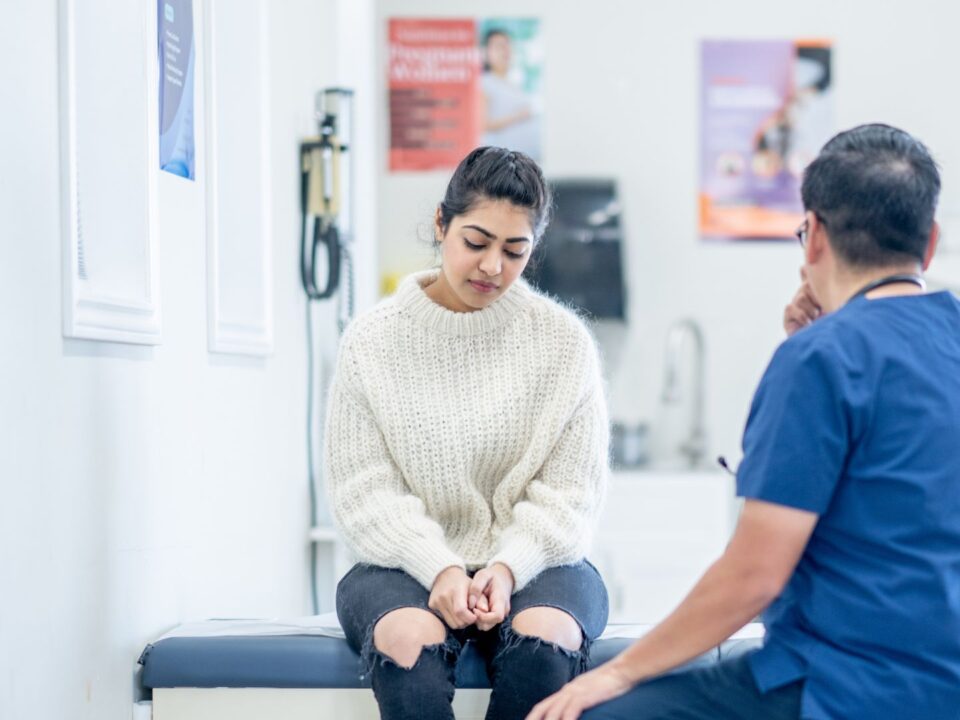
Can Intensive Outpatient Program in Indianapolis Treat Depression?
February 6, 2025
What Mental Health Disorders Are Treated in Residential Mental Health Facilities in Indianapolis?
February 14, 2025Leaving residential mental health treatment is a big step. You might wonder what comes next in Indianapolis. The First City Recovery Indianapolis offers safe, focused help for your mind.
This place keeps you away from stress and things that could hurt your recovery.
We will guide you through life after treatment. We will talk about switching to outpatient care, getting support, and handling medicine. We also cover making a plan for yourself, changing how you live day-to-day, checking on your progress, and what to do if problems come back.
Keep reading to find out more.
Key Takeaways
- After finishing treatment, moving to outpatient care involves planning. This includes setting up therapy sessions and getting community help.
- Managing medication with healthcare providers’ help is important after leaving residential care.
- Making a plan for aftercare is key. It should have goals, healthy habits, and ways to handle stress or triggers.
- Staying in touch with mental health pros helps keep track of progress and deal with any hard times that come up.
- Exercise and eating right are big parts of staying well after treatment.
Transitioning from Residential to Outpatient Care
Transitioning from residential to outpatient care requires careful planning and support. Establishing a smooth transition process and ensuring continued therapy sessions are essential for sustained progress after completing residential mental health treatment in Indianapolis.
Steps to transition smoothly
After completing residential mental health treatment, a smooth transition to outpatient care ensures ongoing recovery. Case managers begin discharge planning upon admission, connecting patients to vital community resources.
- Meet with your case manager to discuss the discharge plan. They help connect you to outpatient services.
- Enroll in subacute residential programs if needed for further stabilization after acute care.
- Ensure a continuum of care by scheduling your first outpatient therapy session before leaving the residential facility.
- Keep the contact information of community resources handy for easy access when needed.
- Plan your weekly schedule to include therapy sessions and any group meetings as part of your outpatient care.
- Regularly communicate with healthcare providers about your progress and any challenges you face.
- Understand and follow guidelines for managing medications post-treatment, working closely with healthcare professionals.
- Participate in community reintegration activities recommended by case managers or therapists to build support systems outside the treatment center.
- Be aware that the average length of stay at The Recovery Village Indianapolis is usually 1-2 weeks, which requires prompt action in planning next steps in care.
These steps aim for a seamless move from residential treatment back into daily life with adequate support and resources.
Importance of continued therapy sessions
Continued therapy sessions are key to staying healthy after leaving residential treatment. These ongoing support meetings help you keep the progress you made. You can choose between individual or group sessions with licensed therapists.
Joining peer support groups, like 12-step programs, also offers extra backing. Aspire Health makes it easy to keep up with these sessions through online appointment scheduling and a patient portal.
This shows how vital continued mental health treatment is for recovery. Now, let’s talk about building a supportive community around you.
Community and Family Support Systems
After completing residential mental health treatment in Indianapolis, you can rely on the support of your family and community. Family plays a crucial role in ongoing recovery, while Indianapolis offers various community resources to aid in your transition back into daily life.
Role of family in ongoing recovery
Family plays a key role in the recovery process after residential mental health treatment. They offer support and help the person stick to their therapy sessions. Family therapy, included in RTC treatment, strengthens this bond and improves communication.
This helps everyone understand the challenges and work together toward recovery. With family involvement, chances of successful ongoing recovery increase.
Community resources in Indianapolis also back up family efforts with group therapy and individualized care plans. These resources aim for inclusivity and nondiscrimination, making sure everyone feels welcome. Working closely with healthcare providers ensures that medication management is part of a well-rounded support system.
Community resources available in Indianapolis
Indianapolis provides a range of community resources to support mental wellness and recovery from addiction. First City Indiana mental Health delivers medical and behavioral health services in addition to community programs.
The First City Mental Health, IN also provides crucial support for those in need. Moreover, the Progress House in Indianapolis works to offer aid for individuals seeking to transition from residential treatment.
These community resources are crucial for continual care and support following residential mental health treatment. They stand as important pillars of support for individuals working towards successful recovery from mental health disorders in Indianapolis.
Managing Medication Post-Treatment
After completing residential mental health facilities in Indianapolis treatment, managing medication is crucial for your ongoing care. You will work with healthcare providers to set guidelines and collaborate on your medication management plan.
Guidelines for medication management
After completing residential mental health treatment, it’s crucial to carefully manage medication to support ongoing recovery. Here are the guidelines for effective medication management:
- Follow the prescribed medication administration schedule carefully.
- Ensure consistent and accurate prescription management, including refills and renewals.
- Engage in pharmacological treatment with your healthcare provider to monitor drug therapy progress.
- Adhere to pharmaceutical care practices, promoting medication compliance for optimal results.
- Collaborate closely with healthcare providers to manage and monitor your medication regimen effectively.
Collaboration with healthcare providers
After completing residential mental health treatment, it’s crucial to maintain medical supervision and collaborate with healthcare providers for post-treatment support. The recovery center provides behavioral health services along with online appointment scheduling and a patient access portal.
The accredited treatment center emphasizes the importance of collaborative healthcare by offering recovery support services through telehealth services, ensuring continuity of care in managing medication post-treatment and accessing behavioral therapy.
Developing a Personalized Aftercare Plan
After completing residential mental health treatment in Indianapolis, it’s essential to set realistic goals and identify potential triggers and coping strategies. Incorporating routine exercise and healthy eating habits into your aftercare plan can support ongoing recovery.
Setting realistic goals
When you’re ready to leave residential mental health treatment at Aspire Health, it’s important to develop a realistic aftercare plan. This includes setting achievable goals that support your continuing recovery.
The personalized recovery plan at for mental health is customized for long-term success and involves case management services, evidence-based therapies like CBT, DBT, and TF-CBT, as well as education and job training programs.
Furthermore, they offers a sliding fee schedule based on income and family size to make these resources accessible to everyone in need of ongoing mental health support.
In Indianapolis, the First City Mental Health provides a comprehensive aftercare program created to enhance long-term recovery options for individuals transitioning from residential treatment to outpatient care.
Setting realistic goals within this personalized aftercare plan is crucial for sustaining progress post-treatment.
Identifying potential triggers and coping strategies
After completing residential mental health treatment in Indianapolis, it’s important to develop a personalized aftercare plan. This plan should focus on identifying potential triggers and coping strategies. Here are essential steps to consider:
- Shielding patients from daily stressors and triggers through a supportive environment.
- Offering therapeutic activities such as art therapy to aid in the coping process.
- Providing Medication-Assisted Treatment (MAT) as part of the post-treatment plan.
- Including family and group therapy sessions for ongoing support.
- Recognizing potential triggers and developing coping strategies as part of individualized aftercare planning.
Developing a personalized aftercare plan is crucial for long-term mental health maintenance, setting realistic goals and providing support when individuals face potential triggers or stressors.
The Importance of Lifestyle Adjustments
Develop a personalized aftercare plan, setting realistic goals and identifying potential triggers and coping strategies. Incorporate routine exercise and healthy eating habits to support ongoing recovery.
Incorporating routine exercise
In Indianapolis, the best mental health facilities in Indianapolis offer recreational lounges, sports facilities, and activity-based therapy. These are crucial for physical well-being post-treatment.
It’s crucial to partake in exercise routines as part of lifestyle adjustments after residential care. This could involve following a customized exercise regimen or engaging in wellness programs that emphasize physical activities and sports.
They also highlights the importance of lifestyle changes by including physical wellness initiatives in their treatment plans. This underscores the significance of regular exercise in managing mental health disorders after residential treatment, reaffirming its role as a vital part of ongoing recovery efforts.
Healthy eating habits
Including routine exercise is crucial in mental health recovery. Likewise, healthy eating habits play a significant role. Nutritional counseling and balanced nutrition are fundamental components of post-residential mental health care.
Aspire Health provides primary medical care, including nutritional guidance for individuals transitioning from residential treatment to outpatient care in Indianapolis. This ensures that patients continue to receive comprehensive support for their physical and mental well-being as they progress through their recovery journey.
Moreover, they offers balanced meals as part of the inpatient program, emphasizing the importance of healthy eating as a fundamental aspect of holistic treatment.
Balanced nutrition goes hand in hand with managing medication post-treatment. They integrates recovery services such as nutritional guidance into its programs, highlighting the interconnectedness between physical and mental health.
Additionally, RTC includes healthy lifestyle education in treatment plans, ensuring that individuals leaving residential programs have the knowledge and resources to maintain proper nutrition for ongoing wellness.
Monitoring Progress and Handling Relapses
After completing mental health facilities Indianapolis for residential treatment, staying connected with mental health professionals is vital. Regular check-ins help track your progress and provide support in handling any potential setbacks.
It’s important to stay proactive in managing your mental health to maintain your well-being effectively.
Regular check-ins with mental health professionals
After completing residential mental health treatment, it’s essential to have regular follow-ups with mental health professionals. This can involve individual therapy sessions and psychiatric care appointments to monitor progress and offer ongoing support.
For instance, First City Mental Health provides online appointment scheduling for emotional wellness check-ups, as well as crisis intervention through their dedicated phone lines.
These regular follow-ups aid in preventing relapse and managing any challenges during the recovery process.
These follow-ups also play a crucial role in ensuring that treatment plans are customized to each individual’s needs, offering personalized care plans and guidance from behavioral health professionals.
Moreover, they serve as a supportive measure for individuals seeking comprehensive support beyond counseling services post-treatment.
Strategies to handle potential setbacks
After completing residential mental health Indianapolis treatment, it’s crucial to have strategies in place to handle potential setbacks. Here are some approaches to consider:
- Regular Check-ins with Mental Health Professionals: Set up regular appointments with your mental health provider to monitor progress and address any emerging challenges.
- Identifying Triggers and Coping Strategies: Collaborate with your therapist to identify potential triggers for relapse and develop effective coping methods to manage them.
- Utilize Supportive Therapies: Engage in supportive therapies such as behavioral therapy, group counseling, and family support to strengthen your resilience against setbacks.
- Embrace Relapse Prevention Techniques: Learn and put into practice relapse prevention strategies provided during treatment to proactively address challenges.
- Develop a Strong Support System: Surround yourself with a strong support network of family, friends, and community resources available in Indianapolis to help navigate through difficult times.
- Practice Self-care and Stress Management: Prioritize self-care by including stress-reducing activities into your daily routine such as exercise, mindfulness practices, or hobbies.
- Be Knowledgeable About Medication Management: Understand the guidelines for managing medication post-treatment and collaborate closely with healthcare providers regarding any adjustments needed.
Keep in mind, setbacks are normal in the recovery process; having a plan in place can help you effectively address these challenges.
Conclusion
In Indianapolis, finishing residential mental health treatment marks the start of your path to recovery. Moving seamlessly to outpatient care and maintaining therapy sessions are essential in sustaining progress.
Family support and community resources are crucial in ongoing recovery, while coordinating medication post-treatment necessitates working closely with healthcare providers and adhering to guidelines.
Creating a personalized aftercare plan, adjusting lifestyle, monitoring progress, and addressing potential challenges are pivotal steps toward leading a fulfilling life after residential treatment.
As you adopt these strategies, keep in mind that your dedication to your well-being is significant. Stay motivated as you progress towards regaining control with the help of a mental health therapist Indianapolis.
FAQs
What should I expect after finishing residential mental health treatment in Indianapolis?
After completing treatment, you can expect to transition into outpatient care or support groups. These options help maintain your progress and provide ongoing support.
How can I stay connected with my therapist after treatment?
You can schedule regular follow-up sessions with your therapist. This helps ensure you have guidance as you adjust back to daily life.
What resources are available for continued support in Indianapolis?
In Indianapolis, there are many resources like counseling centers, support groups, and community programs that offer assistance after residential treatment.
How do I handle challenges or setbacks once I’m home?
It’s normal to face challenges after returning home. Use coping strategies learned during treatment and reach out for help when needed from friends, family, or professionals.






